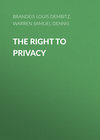Читать книгу: «The Right to Privacy»
THE RIGHT TO PRIVACY
"It could be done only on principles of private justice, moral fitness, and public convenience, which, when applied to a new subject, make common law without a precedent; much more when received and approved by usage."
Willes, J., in Millar v. Taylor, 4 Burr. 2303, 2312.
That the individual shall have full protection in person and in property is a principle as old as the common law; but it has been found necessary from time to time to define anew the exact nature and extent of such protection. Political, social, and economic changes entail the recognition of new rights, and the common law, in its eternal youth, grows to meet the demands of society. Thus, in very early times, the law gave a remedy only for physical interference with life and property, for trespasses vi et armis. Then the "right to life" served only to protect the subject from battery in its various forms; liberty meant freedom from actual restraint; and the right to property secured to the individual his lands and his cattle. Later, there came a recognition of man's spiritual nature, of his feelings and his intellect. Gradually the scope of these legal rights broadened; and now the right to life has come to mean the right to enjoy life, – the right to be let alone; the right to liberty secures the exercise of extensive civil privileges; and the term "property" has grown to comprise every form of possession – intangible, as well as tangible.
Thus, with the recognition of the legal value of sensations, the protection against actual bodily injury was extended to prohibit mere attempts to do such injury; that is, the putting another in fear of such injury. From the action of battery grew that of assault.1 Much later there came a qualified protection of the individual against offensive noises and odors, against dust and smoke, and excessive vibration. The law of nuisance was developed.2 So regard for human emotions soon extended the scope of personal immunity beyond the body of the individual. His reputation, the standing among his fellow-men, was considered, and the law of slander and libel arose.3 Man's family relations became a part of the legal conception of his life, and the alienation of a wife's affections was held remediable.4 Occasionally the law halted, – as in its refusal to recognize the intrusion by seduction upon the honor of the family. But even here the demands of society were met. A mean fiction, the action per quod servitium amisit, was resorted to, and by allowing damages for injury to the parents' feelings, an adequate remedy was ordinarily afforded.5 Similar to the expansion of the right to life was the growth of the legal conception of property. From corporeal property arose the incorporeal rights issuing out of it; and then there opened the wide realm of intangible property, in the products and processes of the mind,6 as works of literature and art,7 goodwill,8 trade secrets, and trade-marks.9
This development of the law was inevitable. The intense intellectual and emotional life, and the heightening of sensations which came with the advance of civilization, made it clear to men that only a part of the pain, pleasure, and profit of life lay in physical things. Thoughts, emotions, and sensations demanded legal recognition, and the beautiful capacity for growth which characterizes the common law enabled the judges to afford the requisite protection, without the interposition of the legislature.
Recent inventions and business methods call attention to the next step which must be taken for the protection of the person, and for securing to the individual what Judge Cooley calls the right "to be let alone."10 Instantaneous photographs and newspaper enterprise have invaded the sacred precincts of private and domestic life; and numerous mechanical devices threaten to make good the prediction that "what is whispered in the closet shall be proclaimed from the house-tops." For years there has been a feeling that the law must afford some remedy for the unauthorized circulation of portraits of private persons;11 and the evil of the invasion of privacy by the newspapers, long keenly felt, has been but recently discussed by an able writer.12 The alleged facts of a somewhat notorious case brought before an inferior tribunal in New York a few months ago,13 directly involved the consideration of the right of circulating portraits; and the question whether our law will recognize and protect the right to privacy in this and in other respects must soon come before our courts for consideration.
Of the desirability – indeed of the necessity – of some such protection, there can, it is believed, be no doubt. The press is overstepping in every direction the obvious bounds of propriety and of decency. Gossip is no longer the resource of the idle and of the vicious, but has become a trade, which is pursued with industry as well as effrontery. To satisfy a prurient taste the details of sexual relations are spread broadcast in the columns of the daily papers. To occupy the indolent, column upon column is filled with idle gossip, which can only be procured by intrusion upon the domestic circle. The intensity and complexity of life, attendant upon advancing civilization, have rendered necessary some retreat from the world, and man, under the refining influence of culture, has become more sensitive to publicity, so that solitude and privacy have become more essential to the individual; but modern enterprise and invention have, through invasions upon his privacy, subjected him to mental pain and distress, far greater than could be inflicted by mere bodily injury. Nor is the harm wrought by such invasions confined to the suffering of those who may be made the subjects of journalistic or other enterprise. In this, as in other branches of commerce, the supply creates the demand. Each crop of unseemly gossip, thus harvested, becomes the seed of more, and, in direct proportion to its circulation, results in a lowering of social standards and of morality. Even gossip apparently harmless, when widely and persistently circulated, is potent for evil. It both belittles and perverts. It belittles by inverting the relative importance of things, thus dwarfing the thoughts and aspirations of a people. When personal gossip attains the dignity of print, and crowds the space available for matters of real interest to the community, what wonder that the ignorant and thoughtless mistake its relative importance. Easy of comprehension, appealing to that weak side of human nature which is never wholly cast down by the misfortunes and frailties of our neighbors, no one can be surprised that it usurps the place of interest in brains capable of other things. Triviality destroys at once robustness of thought and delicacy of feeling. No enthusiasm can flourish, no generous impulse can survive under its blighting influence.
It is our purpose to consider whether the existing law affords a principle which can properly be invoked to protect the privacy of the individual; and, if it does, what the nature and extent of such protection is.
Owing to the nature of the instruments by which privacy is invaded, the injury inflicted bears a superficial resemblance to the wrongs dealt with by the law of slander and of libel, while a legal remedy for such injury seems to involve the treatment of mere wounded feelings, as a substantive cause of action. The principle on which the law of defamation rests, covers, however, a radically different class of effects from those for which attention is now asked. It deals only with damage to reputation, with the injury done to the individual in his external relations to the community, by lowering him in the estimation of his fellows. The matter published of him, however widely circulated, and however unsuited to publicity, must, in order to be actionable, have a direct tendency to injure him in his intercourse with others, and even if in writing or in print, must subject him to the hatred, ridicule, or contempt of his fellow-men, – the effect of the publication upon his estimate of himself and upon his own feelings not forming an essential element in the cause of action. In short, the wrongs and correlative rights recognized by the law of slander and libel are in their nature material rather than spiritual. That branch of the law simply extends the protection surrounding physical property to certain of the conditions necessary or helpful to worldly prosperity. On the other hand, our law recognizes no principle upon which compensation can be granted for mere injury to the feelings. However painful the mental effects upon another of an act, though purely wanton or even malicious, yet if the act itself is otherwise lawful, the suffering inflicted is damnum absque injuria. Injury of feelings may indeed be taken account of in ascertaining the amount of damages when attending what is recognized as a legal injury;14 but our system, unlike the Roman law, does not afford a remedy even for mental suffering which results from mere contumely and insult, from an intentional and unwarranted violation of the "honor" of another.15












